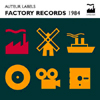"Auteur Labels: Factory Records 1984"
 The latest release in LTM’s Auteur Labels series makes the odd curatorial choice of focusing on just one year in the life of Factory Records and 1984 is undeniably a rather unexpected year to pick- Martin Hannett was gone, the Haςienda (FAC-51) was not yet wildly popular and was still hemorrhaging money, and most of the label’s major bands did not record anything of consequence. Nevertheless, the gamble decisively pays off, as the rarities and obscurities compiled here showcase the freewheeling brilliance, eccentricity, and absurdity of the Factory milieu far more strikingly than any “greatest hits” compilation ever could have.
The latest release in LTM’s Auteur Labels series makes the odd curatorial choice of focusing on just one year in the life of Factory Records and 1984 is undeniably a rather unexpected year to pick- Martin Hannett was gone, the Haςienda (FAC-51) was not yet wildly popular and was still hemorrhaging money, and most of the label’s major bands did not record anything of consequence. Nevertheless, the gamble decisively pays off, as the rarities and obscurities compiled here showcase the freewheeling brilliance, eccentricity, and absurdity of the Factory milieu far more strikingly than any “greatest hits” compilation ever could have.
In 1982, producer Martin Hannett famously filed a lawsuit against the other four directors of Factory Records and ultimately left the fold to pursue more alcohol- and heroin-centric pursuits. In typical Factory fashion, this potential disaster was issued a catalog number (FAC-61) and a revolving cast of New Order members and their associates took over production duties under the deliberately generic pseudonym of Be Music. Of course, this resulted in lot of bands sounding suspiciously like New Order, but that aesthetic effectively complemented the label-wide shift in focus away from the arty brooding of bands like Joy Division towards dance clubs and pop charts.
Naturally, the aforementioned New Order are responsible for one of the best songs on the album: the pleasantly lurching “Lonesome Tonight,” which was the B-side to the "Thieves Like Us" single and began its life as a half-assed cover of an Elvis Presley live recording. The Wake’s propulsive “Talk About The Past” is also immediately gratifying, even though it sounds almost exactly like New Order (a good song is still a good song, even if it lacks originality). The other unqualified success on the album is the infectious synthpop of Red Turns To’s “Deep Sleep” (whom I had never even heard of). Fortunately, while the quality of the rest of the compilation veers wildly, it remains uniformly compelling for other reasons.
For one, the album is bursting with guilty pleasures. I was especially delighted by the inclusion of a Shark Vegas rarity ("Pretenders of Love”) that was originally only available on a 1987 compilation entitled Young, Popular, and Sexy. The magic of Shark Vegas is that they sound exactly like New Order, but comically exaggerated in all respects (especially the vocals). This particular cut does not let me down and even surprised me with a hair metal guitar solo. Then there is Quando Quango’s “Atom Rock,” which is quite possibly the single worst song that I have ever heard (perhaps more painful than even Rob Gretton’s molar reconstruction (FAC-99)). Despite featuring uncharacteristically funky guitar by Johnny Marr and production by Bernard Sumner, it fails on literally every level and approximates a lobotomized Haircut 100. That said, it is so profoundly moronic (“atom rock from the bottom to the top, atom rock tell me when its gonna stop”) and inept that it somehow transcends mere awfulness and becomes perversely infectious. It is a horror that I cannot turn my ears away from.
Of course, Factory released quite a bit of forgettable—perhaps even genuinely awful—material as well. One of the compilation’s more baffling aberrations is a mediocre piano and violin classical piece by The Durutti Column (“Duet (Without Mercy)”), which Vini Reilly describes in the colorful liner notes thusly: "Without Mercy is a joke. That album’s terrible. It was all Tony Wilson’s idea to make it more classical.”
Also, while this disc regrettably contains no A Certain Ratio songs, the ACR gang are conspicuously involved in virtually all its clumsiest and most embarrassing moments. Nearly the entire band played on Kalima’s smooth vocal jazz abortion “The Smiling Hour” and former frontman Simon Topping delivers his own solo Latin jazz atrocity entitled “Chicas del Mundo” (Tony Wilson believed that Topping was “so upset by the death of Ian Curtis that he turned his back on singing, and instead retreated behind a set of bongos.”). Incidentally, Topping later joined the above-mentioned Quando Quango to continue his post-ACR streak of crimes against music. Also, ACR drummer Donald Johnson’s brother delivers a sub-Blondie rap interlude on 52nd Street’s “Can’t Afford” and Johnson himself is credited as co-producer for “Atom Rock.” I should perhaps note that despite arousing my extreme antipathy, Quando Quango are regarded as very influential on the early NYC and Chicago dance music scenes. Of course, that does not mean that their music has aged well.
That said, nearly all of the “bad” songs on Factory Records 1984 are still quite fun, and curator James Nice’s quixotic warts-and-all approach has unexpectedly resulted in a great album. Factory’s tireless enthusiasm, willingness to very publicly fail, propensity for throwing huge sums of money at ridiculous shit (like Happy Monday’s albums), and unwavering sense of humor (there are catalog numbers for both the Haςienda’s cat (FAC-191) and Tony Wilson’s coffin (FAC-501)) made it uniquely human and deservedly beloved and Nice has done a remarkable job of capturing that elusive spirit. Further installments in this series would be extremely welcome.
Samples:
- Red Turns To – Deep Sleep
- Shark Vegas – Pretenders of Love
- Quando Quango – Atom Rock



